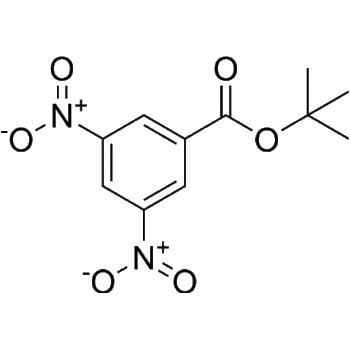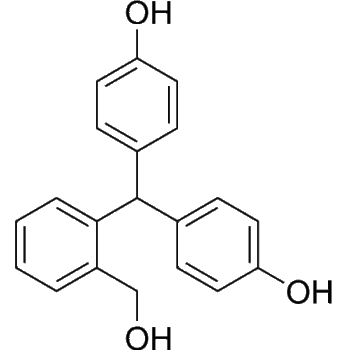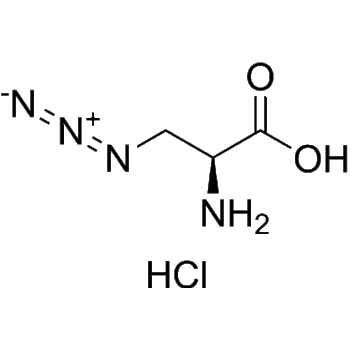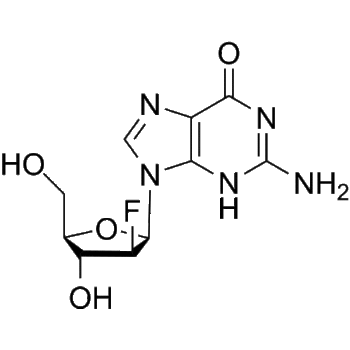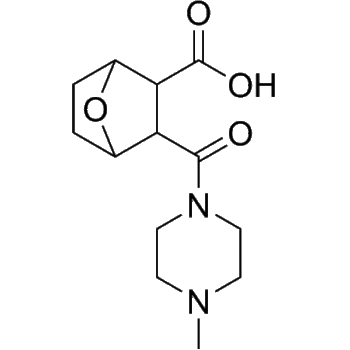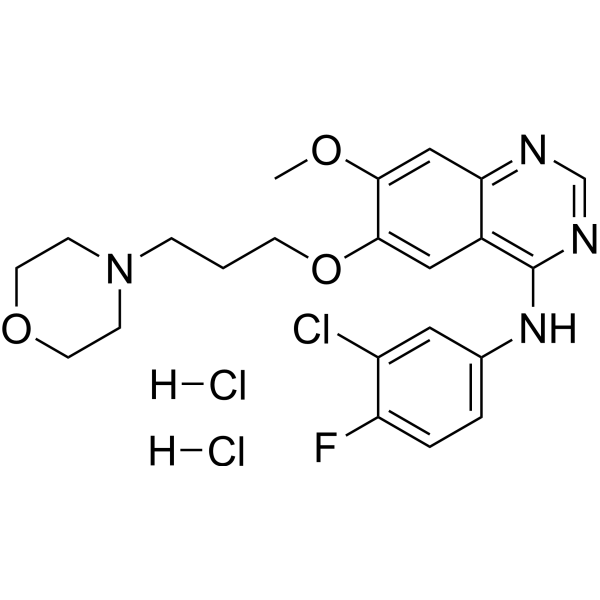
Download Files:
Gefitinib (dihydrochloride)
SKU
HY-50895B-Get quote
Category Reference compound
Tags Apoptosis;Autophagy;EGFR, Apoptosis;Autophagy;JAK/STAT Signaling;Protein Tyrosine Kinase/RTK, Cancer
Products Details
Product Description
– Gefitinib (ZD 1839) dihydrochloride is a potent, selective and orally active EGFR tyrosine kinase inhibitor with an IC50 of 33 nM. Gefitinib dihydrochloride selectively inhibits EGF-stimulated tumor cell growth (IC50 of 54 nM) and blocks EGF-stimulated EGFR autophosphorylation in tumor cells. Gefitinib dihydrochloride also induces autophagy and cell apoptosis, which can be used for cancer related research, such as Lung cancer and breast cancer [1][2][5].
Web ID
– HY-50895B
Shipping
– Room temperature
Applications
– Cancer-Kinase/protease
Molecular Formula
– C22H26Cl3FN4O3
References
– [1]Tomoya Takenaka, et al. Effects of gefitinib treatment on cellular uptake of extracellular vesicles in EGFR-mutant non-small cell lung cancer cells. Int J Pharm. 2019 Dec 15;572:118762. |[2]Amin Li, et al. Gefitinib sensitization of cisplatin-resistant wild-type EGFR non-small cell lung cancer cells. J Cancer Res Clin Oncol. 2020 Jul;146(7):1737-1749. |[3]Wakeling AE, et al. ZD1839: an orally active inhibitor of epidermal growth factor signaling with potential for cancer therapy. Cancer Res. 2002 Oct 15;62(20):5749-54. |[4]Pedersen MW, et al. Differential response to gefitinib of cells expressing normal EGFR and the mutant EGFRvIII. Br J Cancer. 2005 Oct 17;93(8):915-23. |[5]Muhammad Tariq, et al. Gefitinib inhibits M2-like polarization of tumor-associated macrophages in Lewis lung cancer by targeting the STAT6 signaling pathway. Acta Pharmacol Sin. 2017 Nov;38(11):1501-1511. |[6]Mark S Cragg, et al. Gefitinib-induced killing of NSCLC cell lines expressing mutant EGFR requires BIM and can be enhanced by BH3 mimetics. PLoS Med. 2007 Oct;4(10):1681-89; discussion 1690. |[7]Marie P Piechocki, et al. Gefitinib prevents cancer progression in mice expressing the activated rat HER2/neu. Int J Cancer. 2008 Apr 15;122(8):1722-9.
CAS Number
– 184475-56-7
Molecular Weight
– 519.82
SMILES
– COC1=CC2=NC=NC(NC3=CC=C(F)C(Cl)=C3)=C2C=C1OCCCN4CCOCC4.[H]Cl.[H]Cl
Clinical Information
– Launched
Research Area
– Cancer
Solubility
– 10 mM in DMSO
Target
– Apoptosis;Autophagy;EGFR
Pathway
– Apoptosis;Autophagy;JAK/STAT Signaling;Protein Tyrosine Kinase/RTK
Product type
– Reference compound
Disclaimer: All products are for Research use only unless clearly stated otherwise on the product datasheet. Datasheets provided on the website are drafts for reference purpose only and you are requested to always refer to the hard copy included in the kit for your experimentation. Agdia Products are available for delivery only in Canada.
